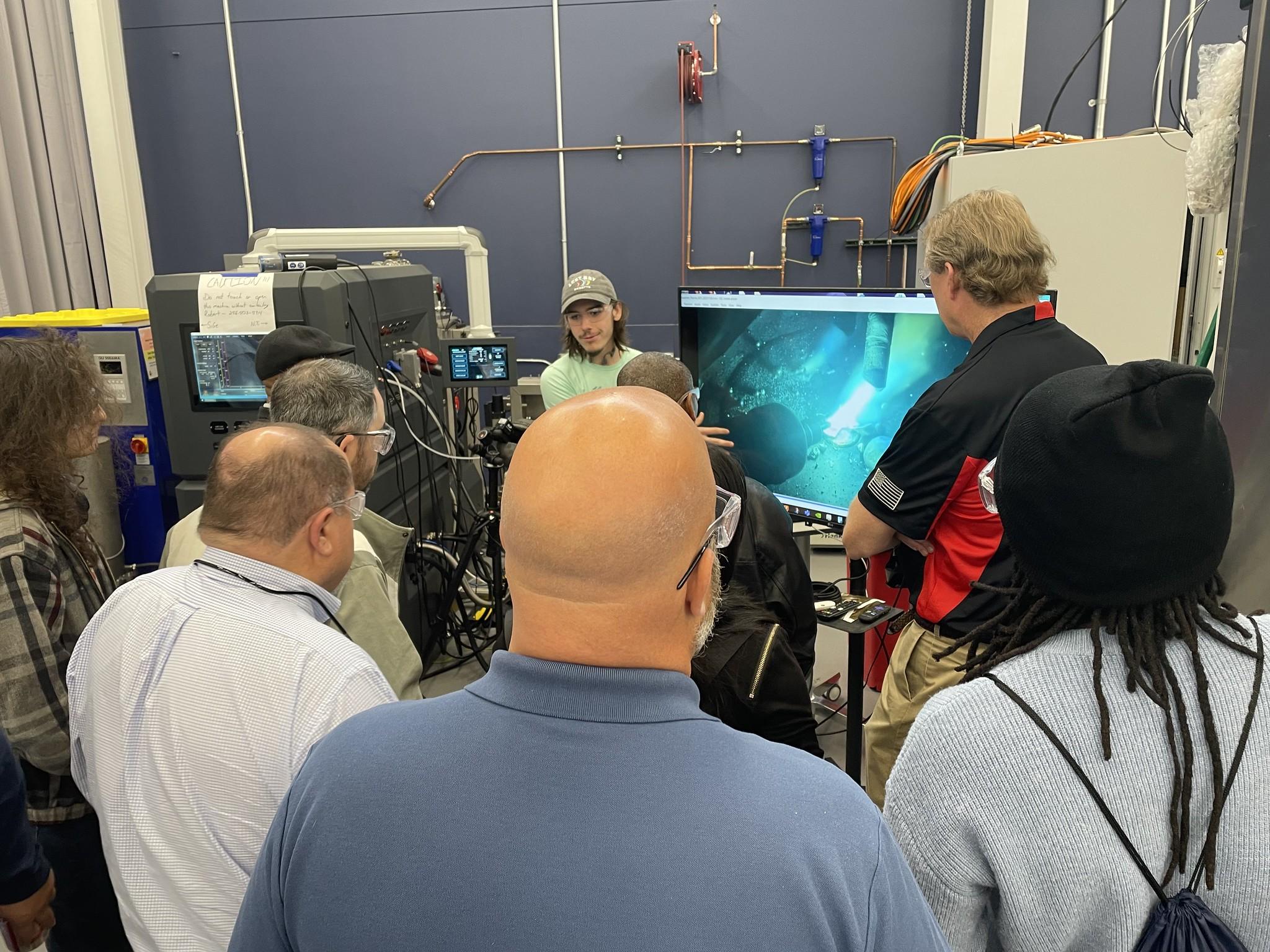New Partnership Connects Technical College Students with New Manufacturing Skills
Dec 08, 2023 —

A TCSG group viewed the making of metal powder alloys.
To gain an edge in manufacturing, it helps to have experience with new and emerging technologies.
That’s why faculty at Georgia Institute of Technology are partnering with the Technical College System of Georgia to provide TCSG students with experience and training in cutting-edge manufacturing technologies. The collaboration between the institutions will bring students to Georgia Tech’s Advanced Manufacturing Pilot Facility for internships and apprenticeships that prepare them for careers using advanced manufacturing technologies such as robotics, AI and metals 3-D printers.
With this experience, students will help pave the way for advancing Georgia’s manufacturing economy.
“We are establishing workforce training programs that are at the frontier of technology. Students will train on the latest equipment and software and then be ready to enter companies as these new technologies are adopted instead of the traditional mode of waiting for the technology to arrive, and then training the workforce,” said Aaron Stebner, the Eugene C. Gwaltney Jr. Chair in Manufacturing.
Stebner initiated the workforce program through the Georgia Artificial Intelligence in Manufacturing (Georgia-AIM) project, a collection of $65 million in federal grants aimed at enhancing Georgia’s AI manufacturing technology and workforce. “These jobs are coming, and we want the workforce to be ready at the same time the need arises.”
Faculty and students from Georgia Tech and TCSG recently met to discuss details and next steps for the program. This included discussing formats that would work for students, and how the opportunities at the Advanced Manufacturing Pilot Facility dovetailed with training students receive from their technical college programs.
The larger goal, said Stebner, is to leverage the developing technologies at the manufacturing facility to give TCSG students in-depth experience with a new technology before starting their own careers. For example, technical college students often have access to tooling and cutting machines as part of their training. But at Georgia Tech’s manufacturing facility, these machines are augmented with robotics or “digital twins”—advanced computer models that can be used to increase performance efficiencies and maintenance schedules of the machines.
By gaining experience with these new technologies, students can enter the workforce better prepared to take on advanced manufacturing solutions. This also translates to a higher-skilled workforce and better-paying jobs, added Stebner.
To drive this message home, the meeting also included several representatives from manufacturers who expressed a need for this kind of training. “We’re always looking for people who are willing to work with their hands,” said Chuck Boyles, president of Factory Automation Systems, a Georgia-based robotics company. “We’re always looking for good technical talent.”
The program can help bridge a “middle ground” between technical college training and the research and development taking place at Georgia Tech, said Steven Sheffield, senior assistant director of research at the Advanced Manufacturing Pilot Facility.
“We have a lot of applications for these skills, like machine operators. But we want to advance that to, for example, robotic operators,” said Sheffield, who spoke with the 25 students in attendance about what they would like to get out of the program. “So, they would be more qualified to do other things as well and have a deeper understanding. And when we have employers who say they are interested in a latest technology, we can partner with them to provide that training.”
The students were receptive, noticing the robotics and artificial intelligence-infused technology during a tour of the facility. “I’ve seen a lot of equipment out there that I’ve never seen before,” said Javaski Dewberry, a Georgia Northwest Technical College student studying machining who also works at a manufacturing facility. “It would be a real good experience for me to see how it works.”
Other students were studying mechanical engineering, electrical engineering, robotics and industrial systems. These programs and more could find a place in the program, said Scott McWhorter, interim executive director of the Georgia Tech Manufacturing 4.0 Consortium. The consortium, which is based at the manufacturing facility, works to connect industry, academia and government to advance manufacturing technologies.
The next steps, he added, include ironing out opportunities that work with students’ schedules and training for TCSG faculty on the emerging technologies.
“We’re spending the next few months getting the program outlined, getting things formalized and working with instructors,” he said. “So, we’re working right now to collect a little more feedback to right-size the program and move forward from there.”
Story by: Kristen Morales, Georgia Tech




